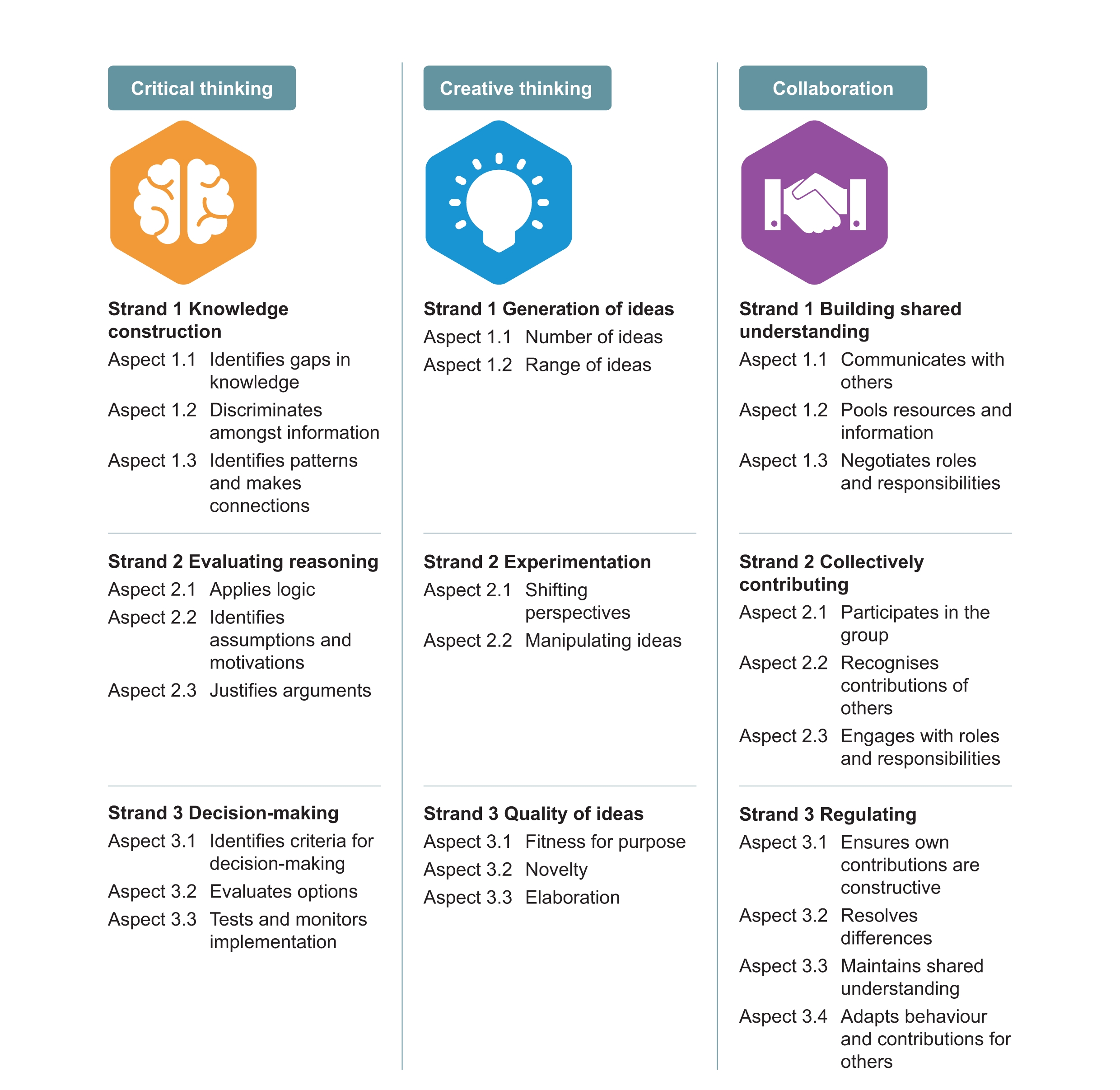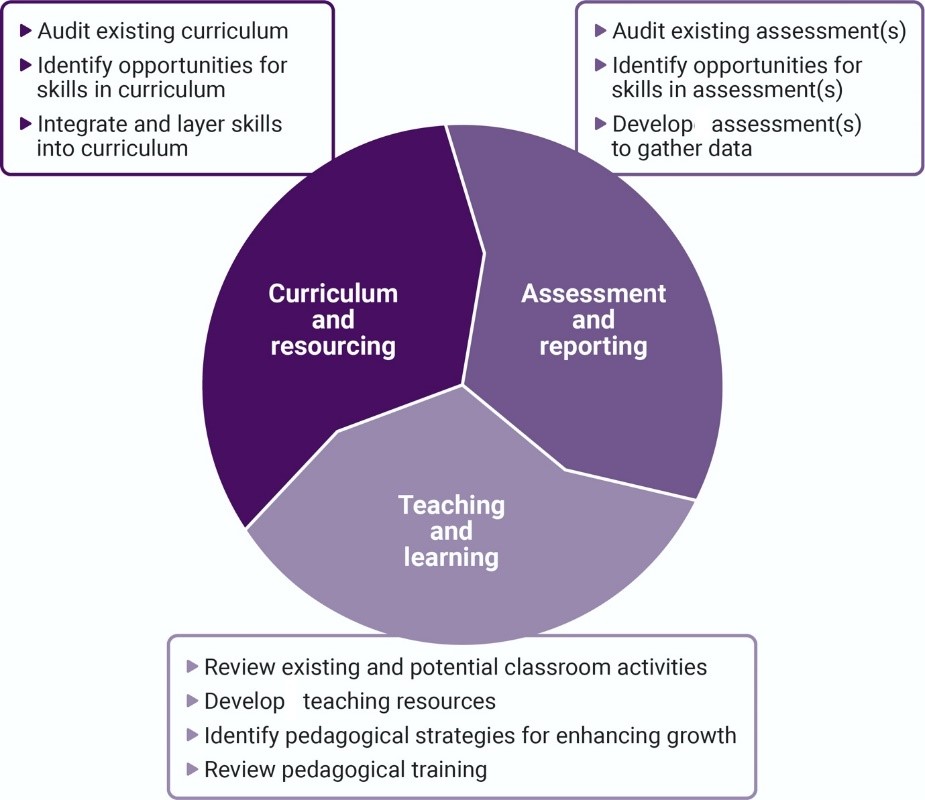
Teaching and assessing 21st century skills
27 Jul 2020 7 minute readIn response to increasing focus of 21st century education on the development of students’ skills, the Centre for Assessment Reform and Innovation (CARI) at the Australian Council for Educational Research (ACER) has developed an evidence-based approach for teaching and assessing critical thinking, creative thinking and collaboration in the classroom.
ACER’s approach to skill development is underpinned by three needs: understanding development, monitoring growth, and ensuring alignment across curriculum, assessment, and pedagogy. To address these needs, ACER developed a combination of skill development frameworks, levels of skill development, and curriculum-orientated assessment and teaching tools.
Skill development frameworks
The skill development frameworks help address issues around the large number of frameworks and definitions for 21st century skills, or general capabilities, which often lack a strong evidence base or detail of how they manifest in the classroom.
As project director Dr Claire Scoular explains in an article published in Teacher, ‘Rather than “reinventing the wheel” to provide alternative definitions than what already exists, “the wheel” has been reorientated to provide detailed descriptions of the skills as … behaviours we can identify and monitor in our students.’
The skill development frameworks outline the aspects students engage in when they are applying the skills and provide their evidentiary basis. The frameworks describe each skill within strands: the overarching conceptual category for framing the skill. Each strand is then further delineated as aspects: specific behaviours that provide foci for teaching and form the basis of assessment.
Figure 1: Summary of skill development frameworks for three skills
Levels of skill development
For each of the selected skills, levels are used to describe how students move from early to more advanced application and understandings. These levels of skill development are not linked to specific years of schooling, and are underpinned by an understanding that students of the same age and in the same year of school can be at very different points in their learning and development.
Like the skill development frameworks, the levels are also divided into strands and aspects. This allows educators to identify and monitor student progress within and across each of the aspects over time, and can support teachers to identify gaps in a learning area.
‘By breaking the skills down into these respective ‘bite-size chunks’ not only are teachers getting to grips with their understanding of the skills, students are too,’ Dr Scoular explains.
The project's conceptualisation of the skills and their respective levels were validated by, and were further informed by, assessment data.
Assessment
To measure critical thinking, creative thinking and collaboration in authentic contexts, Dr Scoular and colleagues developed an assessment template that provides a generalisable approach across skills, grades, and learning areas. The template comprises 10 problem-based learning tasks, each taking from 5 minutes to 30 minutes to complete. Each task focuses on measuring one of the three skills being assessed.
The assessment template can be adapted for an online or offline classroom-based setting. Students primarily work in groups of three, although some tasks focusing on critical and creative thinking require individuals to work independently before returning to the group.
Using the template, ACER has developed Humanities-oriented and STEM-oriented assessment modules for Grade 5 and Grade 8 students. The problem-solving scenarios are designed to be open-ended, requiring significant critical analysis and supporting a broad range of creative solutions as a result of students collaborating in groups of three.
The items within tasks that comprise the assessment modules are based on the strands and subsequent aspects of the skill development frameworks. Scoring guides provide scoring criteria for every item.
ACER trialled the assessment modules with 1806 students from 33 Australian schools. The data revealed that the assessments were well targeted to the selected grades (5 and 8). The majority of items across all three skills showed no difference in the way students of the same ability performed depending on their grade level. Only a small number of items were too easy or too difficult for the targeted population. It was possible for younger students to engage with more sophisticated problem-based scenarios if they were given the appropriate scaffolding, and the problem-based scenarios are framed appropriately.
Ensuring alignment
While the links between curriculum, assessment and pedagogy tend to be well-established in learning areas with a long history, this is less the case with skills. The ACER approach is designed to contribute to the enormous task of embedding skills development into curriculum, assessment, and teaching practices.
As Dr Scoular explains in Teacher, in practice this means educators can focus first on the aspects of a skill, with a view to covering a wider representation of the skill as their understanding builds.
Figure 2: ACER’s alignment model for skills embedment in education systems
Research indicates that many schools or systems are attempting to incorporate the assessment and teaching of skills but most educators have received little training to support understanding of the skills and how they can best be embedded into existing practices.
ACER’s skill development frameworks, level and assessment resources have been publically released for educator use. To further support teachers, ACER offers an online short course in assessing skills for 21st century learners. Course participants take part in a series of guided activities to produce an assessment of collaboration, critical thinking and creative thinking for their own year levels and/or subject area. ■
Read the full report:
Assessment of General Capabilities: Skills for the 21st century learner by Claire Scoular, Dara Ramalingam, Daniel Duckworth and Jonathan Heard, Australia Council for Educational Research, 2020.
Get involved:
ACER has established a General Capabilities Research Community to connect people and organisations with an interest in 21st Century skills assessment, curriculum and pedagogy. The community's free newsletter shares articles, podcasts and more. Join the General Capabilities Research Community.
Find out more:
Claire Scoular, Jonathan Heard and Dara Ramalingam were presenters at our fully online Research Conference 2021. Watch recordings of all events in the main program through our Research Conference On Demand package, available for a limited time. Find out more.


